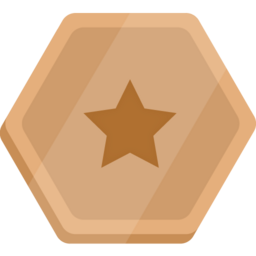Edwards Moses
Menjadi anggota sejak 2022
Bronze League
800 poin
Menjadi anggota sejak 2022

Selesaikan badge keahlian Deploy Kubernetes Applications on Google Cloud tingkat menengah untuk menunjukkan keterampilan dalam hal berikut ini: mengonfigurasi dan membangun image container Docker, membuat dan mengelola cluster Google Kubernetes Engine (GKE), memanfaatkan kubectl untuk pengelolaan cluster yang efisien, dan men-deploy aplikasi Kubernetes dengan praktik continuous delivery (CD) yang andal. Badge keahlian adalah badge digital eksklusif yang diberikan oleh Google Cloud sebagai pengakuan atas kemahiran Anda dalam menggunakan produk dan layanan Google Cloud serta menguji kemampuan Anda dalam menerapkan pengetahuan di lingkungan yang interaktif. Selesaikan kursus badge keahlian ini dan penilaian akhir challenge lab untuk menerima badge keahlian yang dapat Anda bagikan dengan jaringan Anda.
Course four of the Anthos series prepares students to consider multiple approaches for modernizing applications and services within Anthos environments. Topics include optimizing workloads on serverless platforms and migrating workloads to Anthos. This course is a continuation of course three, Anthos on Bare Metal, and assumes direct experience with the topics covered in that course.
Welcome to the Getting Started with Google Kubernetes Engine course. If you're interested in Kubernetes, a software layer that sits between your applications and your hardware infrastructure, then you’re in the right place! Google Kubernetes Engine brings you Kubernetes as a managed service on Google Cloud. The goal of this course is to introduce the basics of Google Kubernetes Engine, or GKE, as it’s commonly referred to, and how to get applications containerized and running in Google Cloud. The course starts with a basic introduction to Google Cloud, and is then followed by an overview of containers and Kubernetes, Kubernetes architecture, and Kubernetes operations.
This course introduces you to fundamentals, practices, capabilities and tools applicable to modern cloud-native application development using Google Cloud Run. Through a combination of lectures, hands-on labs, and supplemental materials, you will learn how to on Google Cloud using Cloud Run.design, implement, deploy, secure, manage, and scale applications
In this course, application developers learn how to design and develop cloud-native applications that seamlessly integrate components from the Google Cloud ecosystem. Through a combination of presentations, demos, and hands-on labs, participants learn how to create repeatable deployments by treating infrastructure as code, choose the appropriate application execution environment for an application, and monitor application performance. Completing one version of each lab is required. Each lab is available in Node.js. In most cases, the same labs are also provided in Python or Java. You may complete each lab in whichever language you prefer.
In this course, application developers learn how to design and develop cloud-native applications that seamlessly integrate managed services from Google Cloud. Through a combination of presentations, demos, and hands-on labs, participants learn how to develop more secure applications, implement federated identity management, and integrate application components by using messaging, event-driven processing, and API gateways. Completing one version of each lab is required. Each lab is available in Node.js. In most cases, the same labs are also provided in Python or Java. You may complete each lab in whichever language you prefer. This is the second course of the Developing Applications with Google Cloud series. After completing this course, enroll in the App Deployment, Debugging, and Performance course.
In this course, application developers learn how to design and develop cloud-native applications that seamlessly integrate managed services from Google Cloud. Through a combination of presentations, demos, and hands-on labs, participants learn how to apply best practices for application development and use the appropriate Google Cloud storage services for object storage, relational data, caching, and analytics. Completing one version of each lab is required. Each lab is available in Node.js. In most cases, the same labs are also provided in Python or Java. You may complete each lab in whichever language you prefer. This is the first course of the Developing Applications with Google Cloud series. After completing this course, enroll in the Securing and Integrating Components of your Application course.
Dasar-Dasar Google Cloud: Infrastruktur Inti memperkenalkan konsep dan terminologi penting untuk bekerja dengan Google Cloud. Melalui video dan lab interaktif, kursus ini menyajikan dan membandingkan banyak layanan komputasi dan penyimpanan Google Cloud, bersama dengan resource penting dan alat pengelolaan kebijakan.